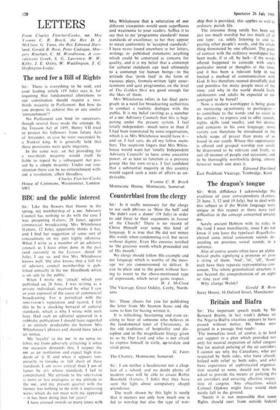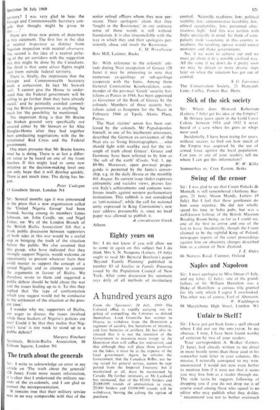Britain and Biafra
Sir: The important speech made by Mr Bernard Braine, in last week's debate on the Nigeria-Biafra situation appears to have passed without notice. He broke new ground in a passage that reads: 'The immediate need, of course, is to lend our support to a plan which provided not only for neutral inspection of relief cargoes but for neutral policing of the air corridors I cannot see why the Canadians, who are respected by both sides, who have already helped with relief to both sides, and who have experience of sophisticated organisa- tion second to none, should not now be asked to provide the means of policing the air corridors and ensuring effective inspec- tion of cargoes. Any objections which Colonel Ojukwu might have would then surely fall to the ground.
`Surely it is not impossible that some flights should start from outside federal territory? I was very glad to hear the Foreign and Commonwealth Secretary con- cede that thought might be given to this
There are three new points of departure in this statement. The first lies in the idea or neutral inspection as distinct from Nigerian inspection with neutral observers. The second is the idea of a neutral polic- lig of the air corridors with the suggestion that this might be done by the Canadians. The third is that some direct flights might ,tart from outside federal territory.
There is, finally, the impression that the Foreign and Commonwealth Secretary made a concession. In fact Mr Stewart +aid: 'I cannot give the House to under- .tand that the Federal government will be ■ fling to go further than they have already stated,' and he pointedly avoided commit- ting the British government to anything. So much for 'the possibility' he mentioned.
The important thing is that Mr Braine has broken ground very specifically not covered either by Mr Stewart or Sir Alec Douglas-Home after they had together been conducting negotiations with the In- ternational Red Cross and the Federal government.
One must presume that Mr Braine knows what he is doing. There is at last a differ- ent voice to be heard on one of the front benches. If this might lead to some new initiative at the decision-making level one can only hope that it will develop quickly. There is not much time. The dying has be- gun.
Peter Cadogan 13 Goodwin Street, London N4
Sir: Several months ago it was announced in the press that a new organisation called the 'United Nigeria Group' had been formed, having among its members James Johnson, MP, John Cordle, MP, and Nigel Fisher, MP. We of the London Branch of the 'British Biafra Association' felt that a frank public discussion between supporters of both sides in this war would be a useful step in bringing the truth of the situation before the public. We also assumed that this group, who have indicated that they strongly support Nigeria, would welcome an opportunity to present whatever facts they could muster to support the concept of a united Nigeria and to attempt to counter the arguments in favour of Biafra. We therefore wrote to them and suggested a public debate should be held about the war and the issues leading up to it. To this they replied that 'the type of confrontation which you suggest would not be conducive to the settlement of the situation at the pres- ent time'.
I wonder why we, supporters of Biafra, are eager to discuss the issues involved while these backers of Nigeria's policies are not? Could it be that they realise that Nig- eria's 'case' is too weak to stand up to a public debate?
Margery Rinehart Secretary, Britain-Biafra Association, 16 Gibson Square, London NI



































 Previous page
Previous page